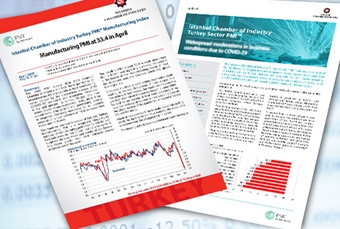News
ICI Turkish Manufacturing PMI April 2020 Report and Turkish Sectoral PMI Report Were Announced
- 01.05.2020
- News

Istanbul Chamber of Industry Türkiye Manufacturing PMI (Purchasing Managers Index), the fastest and most reliable reference for the manufacturing industry’s performance that is the leading indicator of economic growth recessed to 33,4 in April and pointed out to a significant slowdown in the manufacturing industry. Slowdown in the manufacturing industry which has been intensified as the result of the precautions to prevent Covid-19 from being spread was realized in the highest rate since the global financial crises.
The April data of Istanbul Chamber of Industry Turkish Sectoral PMI showed that Covid-19 pandemic considerably affected the whole Turkish manufacturing industry. Operation conditions of the sectors followed up has slown down for the first time since June 2019. The slowdown in the all sectors realized in the highest rate since January 2016 when sectoral PMI series started.
The results of Istanbul Chamber of Industry Türkiye Manufacturing PMI survey (Purchasing Managers Index), the fastest and most reliable reference for the manufacturing industry’s performance that is the leading indicator of economic growth were announced for the term of April 2020.
Based on the survey results where all figures measured over 50,0, the threshold value point out to sectoral improvement, PMI which was measured as 48,1 in March recessed to 33,4 in April and pointed out to a significant slowdown in manufacturing industry. Slowdown in the manufacturing industry which has been intensified as the result of the precautions to prevent Covid-19 from being spread was realized in the highest rate since the global financial crises in 2008.
Manufacturers were observed to give a break for the production in April in a widespread scale, which resulted in a significant slowdown in both production and new orders. The most obvious speed lost was observed since June 2005 when the survey was launched in both indicators. In addition to the decrease in the total new orders, a dense slowdown was recorded in the new export orders of the firms since the pandemic affected all markets in global scale. Deficiency in new orders caused firms to decrease their employment level for the first time in the last four years. This decrease realized in the highest level of the last 11 years. While the purchasing activities decreased in April, it contributed to the decrease in input stocks to gain speed.
Data pointed out that Covid-19 pandemic affected the supply chains in a significant level. Survey participants stated that some suppliers gave a break for the manufacturing activities and some issued were experienced in input supply and logistics. Accordingly, the highest increase of the survey history in input delivery durations was observed. Input costs continued to increase significantly; however, increase realized in the lowest rate of the last three months in April. In general, the firms stated that the main factor which caused increase in input prices was the weakness of Turkish Lira. Manufacturers reacted against the increase in input costs by increasing the prices of final products. Additionally, several firms applied discounts in prices to guarantee their orders which resulted in inflation rate to recede to the lowest level since January.
Andrew Harker, Economy Director of IHS Markit who evaluated the Istanbul Chamber of Industry Turkish Manufacturing PMI Data expressed that:
“April PMI data showed that Covid-19 pandemic and curfew precaution taken against the pandemic affected Turkish manufacturing industry in a negative direction. Slowdown in the production and new orders realized in a higher level than that in the period when the effects of global financial crisis were experienced in the densest level. Firms which cannot maintain to realize new employments based on the severe decrease in the work loads hope that the conditions might improve in the following period.”
All sectors were impacted
The April data of Istanbul Chamber of Industry Turkish Sectoral PMI showed that Covid-19 pandemic considerably affected the whole Turkish manufacturing industry. Operation conditions of the sectors followed up has slow down for the first time since June 2019. The April slowdown in the all sectors realized in the highest rate since January 2016 when sectoral PMI series started. The sector where the production lost speed in the highest rate was the clothing and leather products sector where the recession with the highest rate was experienced. An apparent speed lost was experienced in textile and electrical and electronic products. The slowest recession in the production was observed in the food sector. In parallel to the weakness in the production, slowdown was experienced in new orders as well. Based on the market shrank in global scale, new export orders lost speed almost in general. Partial optimism signs were observed on employment. While the sector of chemicals, plastic and rubber product continued to increase employment, relatively moderate labor force losses were experienced in various sectors such as main metal and textile. Delivery durations of the suppliers in all of the ten sectors increased in a higher level compared to March. Cost inflation gained speed in four sectors and final product prices in all sectors excluding non-metallic mineral products and textile increased.
Andrew Harker, Economy Director of IHS Markit who evaluated the results of April survey stated that:
“All Turkish manufacturing industries in April were exposed to the negative impacts of COVID-19 pandemic. Even the food products sector which demonstrated a build-up in terms of demand in the first stage of the pandemic joined the other sectors in terms of slowdown. Sector of chemicals, plastics and rubber became one of the sectors which showed a strong performance relatively and continued to create employment at the beginning part of the second quarter.